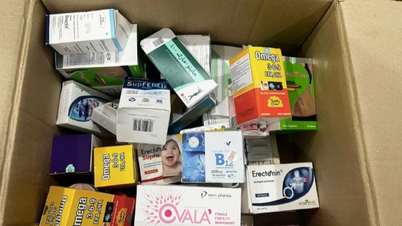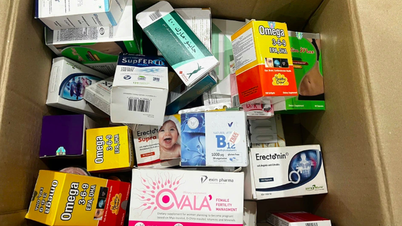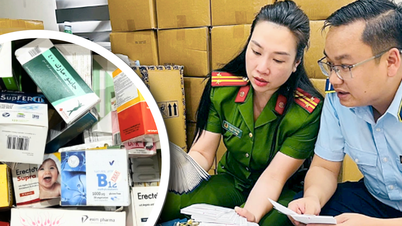Associate Professor, Dr. Pham Bich Dao, a doctor working at Hanoi Medical University Hospital, shared: To avoid diseases transmitted through kissing, the following preventive measures should be taken:
In particular, it is necessary to maintain good oral hygiene, brushing teeth at least twice a day (morning and night) with fluoride toothpaste. Use dental floss or water floss every day to remove plaque. Rinse mouth with antiseptic solution or saline to kill bacteria. Have regular dental check-ups every 6 months to check oral health.
Kiss safely to protect your health and your partner's.
ILLUSTRATION CREATED BY GEMINI
"Oral hygiene is necessary because bacteria, viruses and fungi in the oral cavity can cause pharyngitis, gingivitis, mouth ulcers, sinusitis and many diseases transmitted through kissing," Dr. Dao emphasized.
Avoid kissing when you have symptoms of illness.
Associate Professor, Dr. Pham Bich Dao recommends that to prevent infection when kissing, you should avoid kissing when you are sick or have symptoms of infection; do not kiss when you or your partner have signs of pharyngitis, sore throat (possibly caused by bacteria, viruses such as Streptococcus or Epstein-Barr); mouth ulcers, canker sores (possibly caused by HSV-1); runny nose, stuffy nose, cough (signs of rhinitis, sinusitis caused by bacteria, viruses); when your breath smells bad, white patches on the tongue (signs of oral candidiasis).
When the immune system is weak, the possibility of infection from saliva is higher. Therefore, avoid kissing in the above situations to limit contact with the saliva of the sick person.
Dr. Dao also noted that some viruses such as HSV-1 can survive on the surface of objects and are transmitted through indirect contact, so do not share drinking glasses, spoons, chopsticks, or toothbrushes with others. In particular, do not kiss deeply if you or your partner has cold sores, canker sores, or mouth ulcers. Wash your hands frequently, especially after touching your mouth or nose.
Safe sex prevents throat gonorrhea
"Throat gonorrhea is also transmitted through kissing. It is necessary to use protection during sex, especially when having oral sex, to reduce the risk of throat gonorrhea (gonococcal pharyngitis). Remember to have safe sex, avoid kissing strangers or people with a history of sexually transmitted diseases," Dr. Dao advised.
If at risk, testing for sexually transmitted diseases (STDs) is needed for early detection. Because pharyngeal gonorrhea can be transmitted through contact with Neisseria gonorrhoeae bacteria in the patient's mouth.
In addition, according to Dr. Dao, people need to increase their resistance, have a proper diet, supplement vitamin C, zinc, iron from vegetables and fruits to help strengthen the immune system; drink enough water to keep the throat mucosa moist, limiting the risk of infection. A healthy body helps fight viruses and bacteria transmitted through the mouth.
Getting enough sleep and avoiding stress also helps the immune system function better. In addition, getting vaccinated, such as vaccines against infectious mononucleosis, influenza, and bacterial meningitis, also helps reduce the risk of infection.
"If you have symptoms of hoarseness, persistent sore throat, fever, swollen neck lymph nodes, recurrent cold sores, or non-healing mouth ulcers, you should see a doctor immediately for early diagnosis and treatment," Dr. Dao recommends.
You can get sick through kissing if you come into contact with bacteria, viruses or fungi that cause disease. Take preventive measures such as maintaining oral hygiene, avoiding kissing when sick, practicing safe sex, and boosting your immune system to reduce the risk of infection. If you suspect you have the disease, you need to get examined and treated promptly to avoid complications. Kiss safely to protect your health and that of your partner.
Associate Professor, Dr. Pham Bich Dao (Hanoi Medical University Hospital)
Source: https://thanhnien.vn/phong-benh-lay-qua-nu-hon-nhu-the-nao-185250412201137194.htm





![[Photo] Ready for the top competitions of Vietnamese table tennis](https://vphoto.vietnam.vn/thumb/1200x675/vietnam/resource/IMAGE/2025/5/18/9c547c497c5a4ade8f98c8e7d44f5a41)
![[Photo] Many young people patiently lined up under the hot sun to receive a special supplement from Nhan Dan Newspaper.](https://vphoto.vietnam.vn/thumb/1200x675/vietnam/resource/IMAGE/2025/5/18/6f19d322f9364f0ebb6fbfe9377842d3)






















![[Photo] General Secretary To Lam visits exhibition of achievements in private economic development](https://vphoto.vietnam.vn/thumb/1200x675/vietnam/resource/IMAGE/2025/5/18/1809dc545f214a86911fe2d2d0fde2e8)

































































Comment (0)